Effective Mobility with Stair Trolleys
Date Posted:24 July 2024
Stair trolleys are indispensable tools for enhancing mobility, efficiency, and safety in transporting heavy or bulky items on stairs across residential, commercial, and industrial environments.
Stair trolleys, also known as stair climbing hand trucks or stair climbers, are specialized transport devices designed to facilitate the movement of heavy or bulky items up and down stairs. These innovative tools offer ergonomic features, robust construction, and unique mechanisms that assist users in navigating stairs safely and efficiently. This article explores the functionality, advantages, types, applications, and considerations for choosing stair trolleys in various industries and settings.
Functionality of Stair Trolleys
1. Ergonomic Design: Stair trolleys are engineered with ergonomic handles, adjustable frames, and supportive wheels to reduce strain and enhance user comfort during stair ascents and descents. They feature balanced weight distribution and maneuverability to navigate stairs smoothly.
2. Sturdy Construction: Constructed from durable materials such as steel or aluminum alloys, stair trolleys ensure strength, stability, and long-term durability. They withstand heavy loads and rugged terrain encountered on stairs, ensuring reliable performance in diverse environments.
3. Stair Climbing Mechanism: Stair trolleys incorporate specialized climbing mechanisms, such as tracked or wheeled systems with rotating wheels or caterpillar tracks. These mechanisms enable trolleys to ascend and descend stairs smoothly, minimizing physical exertion and improving efficiency.
4. Versatile Load Capacity: Stair trolleys accommodate various load capacities, ranging from light-duty models for residential use to heavy-duty models capable of transporting industrial equipment, appliances, and furniture weighing several hundred kilograms.
5. Multi-Purpose Applications: Stair trolleys serve multiple purposes across industries, including residential moving, commercial deliveries, facility maintenance, and industrial logistics. They streamline transportation tasks involving stairs, offering practical solutions for moving goods and materials.
Types of Stair Trolleys
1. Manual Stair Trolleys: Manual stair trolleys require operator effort to maneuver loads up and down stairs using ergonomic handles and stair climbing mechanisms. They are versatile, cost-effective solutions for light to moderate-duty applications.
2. Electric Stair Trolleys: Electric-powered stair trolleys feature motorized assistance for stair climbing, reducing operator physical strain and enhancing productivity. They are ideal for handling heavy loads or frequent stair navigation in commercial and industrial environments.
3. Foldable Stair Trolleys: Foldable stair trolleys feature collapsible frames or handles for compact storage and transportability when not in use. They are convenient for residential moving, delivery services, and mobile applications requiring space-saving solutions.
4. Platform Stair Trolleys: Platform-style stair trolleys feature flat load platforms with retaining mechanisms or straps to secure items during transport. They accommodate large, bulky items such as appliances, furniture, and office equipment, ensuring stability on stairs.
5. Dual-Purpose Stair Trolleys: Dual-purpose stair trolleys combine stair climbing capabilities with features such as flat surfaces or convertible designs for use as conventional hand trucks on level ground. They offer versatility for handling diverse transport tasks in different environments.
Benefits of Using Stair Trolleys
1. Improved Safety: Stair trolleys enhance workplace safety by reducing the risk of manual handling injuries and strains associated with moving heavy loads on stairs. They promote ergonomic handling techniques and minimize accidents during transport.
2. Enhanced Efficiency: By facilitating smooth stair navigation, stair trolleys improve operational efficiency and productivity in logistics, delivery services, and facility maintenance. They streamline load handling tasks and optimize workflow in time-sensitive environments.
3. Cost-Effective Transport Solutions: Stair trolleys offer cost-effective solutions for transporting goods and materials without the need for additional lifting equipment or specialized vehicles. They minimize labor costs, equipment investments, and operational downtime associated with manual handling challenges.
4. Accessibility in Challenging Environments: Stair trolleys provide access to elevated or restricted spaces where conventional transport methods are impractical or inaccessible. They maneuver through narrow corridors, doorways, and staircases, expanding operational capabilities in diverse settings.
5. Versatility and Adaptability: Versatile design features and customizable options allow stair trolleys to meet specific transport requirements across industries. They accommodate various load sizes, environments, and operational demands, supporting flexible logistics and facility management strategies.
Applications of Stair Trolleys
1. Residential Moving and Relocations: Stair trolleys assist homeowners, renters, and moving professionals in transporting furniture, appliances, and household items between floors in residential buildings or multi-level homes.
2. Commercial Deliveries and Logistics: In commercial settings, stair trolleys facilitate deliveries of goods, supplies, and equipment to offices, retail stores, and service establishments located on upper floors or in buildings without elevators.
3. Industrial and Construction Sites: Stair trolleys support material handling tasks on construction sites, industrial facilities, and manufacturing plants where heavy machinery, tools, and components must be transported safely on stairs.
4. Facility Maintenance and Services: Facility managers and maintenance personnel use stair trolleys to transport maintenance tools, cleaning supplies, and equipment between floors in hotels, hospitals, schools, and public buildings.
5. Event Management and Venue Services: Stair trolleys assist event planners, caterers, and venue staff in transporting event supplies, audiovisual equipment, and décor items to conference rooms, banquet halls, and event spaces located on multiple levels.
Considerations for choosing Stair Trolleys
When selecting stair trolleys for specific applications, consider the following factors:
1. Load Capacity and Dimensions: Evaluate the maximum weight capacity and dimensions of the trolley to ensure compatibility with the types and sizes of items being transported on stairs.
2. Stair Climbing Mechanism: Choose a stair trolley with a reliable climbing mechanism suitable for the types of stairs encountered, including straight, curved, or uneven surfaces.
3. Maneuverability and Control: Assess ergonomic features such as handle grips, wheel types, and maneuvering controls to optimize operator comfort and control during stair navigation.
4. Durability and Maintenance: Select a stair trolley constructed from robust materials with durable components that withstand frequent use, heavy loads, and rugged terrain encountered on stairs.
5. Safety Features and Compliance: Ensure the stair trolley complies with safety standards and regulations governing manual handling, equipment design, and workplace ergonomics to mitigate risks and ensure user safety.
Stair trolleys are indispensable tools for enhancing mobility, efficiency, and safety in transporting heavy or bulky items on stairs across residential, commercial, and industrial environments. By incorporating ergonomic design features, durable construction, and specialized climbing mechanisms, stair trolleys streamline material handling tasks, minimize physical strain, and optimize operational workflows. Investing in quality stair trolleys tailored to specific transport needs promotes workplace productivity, reduces operational costs, and supports safe handling practices in today's dynamic business landscape.


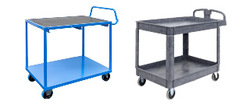
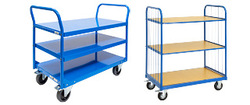
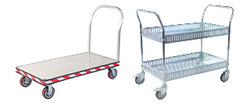
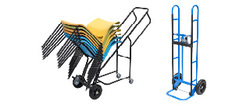
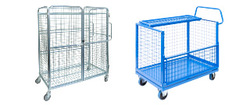
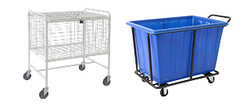
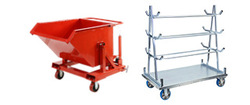
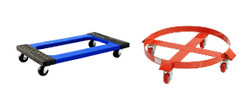
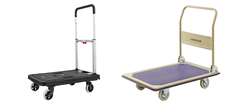
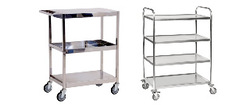
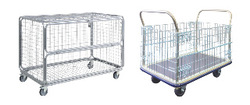
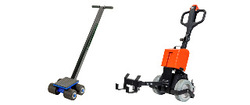
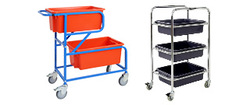
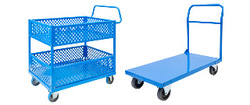
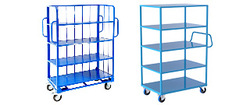
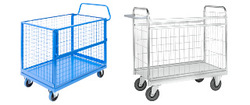
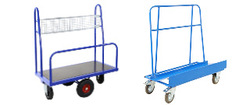
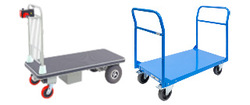
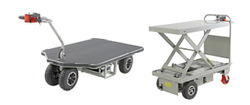
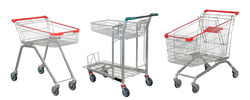
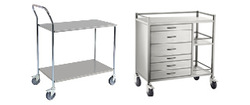
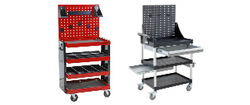
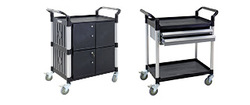
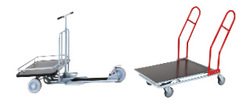
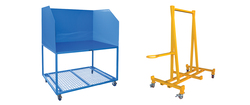



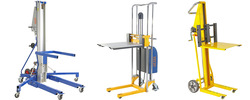



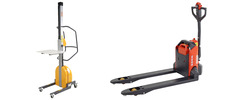
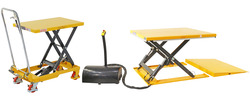
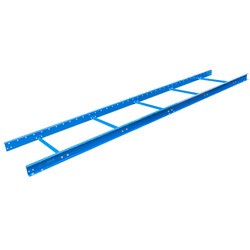
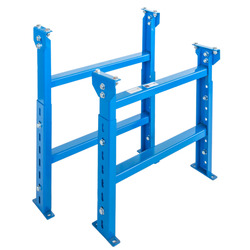
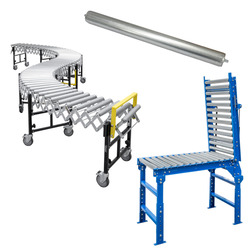
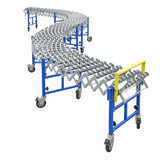


















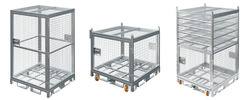

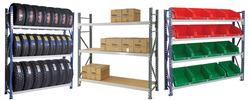
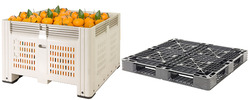
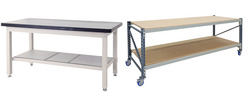
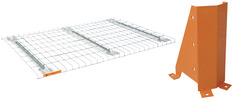
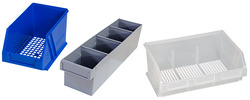

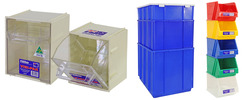

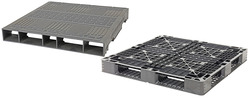

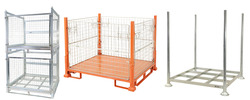
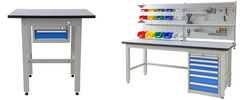
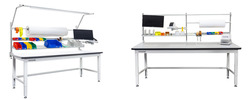


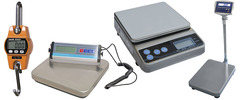



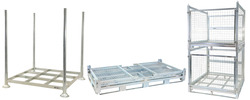
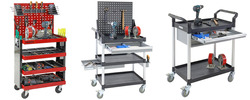
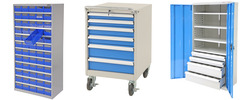

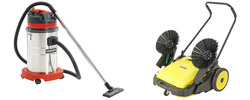











 Trolleys / Hand Trucks
Trolleys / Hand Trucks 2 Tier Trolleys
2 Tier Trolleys 3 Tier Trolleys
3 Tier Trolleys Aluminium Trolleys
Aluminium Trolleys Appliance & Hand Trucks
Appliance & Hand Trucks Cage Trolleys
Cage Trolleys Cleaning Carts & Trolleys
Cleaning Carts & Trolleys Construction Trolleys
Construction Trolleys Dollies
Dollies Foldable Trolleys
Foldable Trolleys Hospital Trolleys
Hospital Trolleys Laundry/Linen Trolleys
Laundry/Linen Trolleys Load Skates & Tow Tugs
Load Skates & Tow Tugs Mail / Office Trolleys
Mail / Office Trolleys Multi Purpose Trolleys
Multi Purpose Trolleys Multi-Tier Shelf Trolleys
Multi-Tier Shelf Trolleys Order Picking Trolleys
Order Picking Trolleys Panel Cart Trolleys
Panel Cart Trolleys Platform Trolleys
Platform Trolleys Powered Trolleys
Powered Trolleys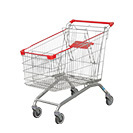 Shopping Trolleys
Shopping Trolleys Stainless Steel Trolleys
Stainless Steel Trolleys Tool Trolleys
Tool Trolleys Utility Carts
Utility Carts Warehouse Trolleys
Warehouse Trolleys Custom Trolleys
Custom Trolleys Lifting Equipment
Lifting Equipment Forklift Attachments
Forklift Attachments Jib Attachments
Jib Attachments Lifting Hoists & Pallet Hooks
Lifting Hoists & Pallet Hooks Manual Stackers & Lifters
Manual Stackers & Lifters Pallet Jacks
Pallet Jacks Pallet Lifters
Pallet Lifters Pallet Rotators & Dispenser
Pallet Rotators & Dispenser Powered Pallet Trucks & Electric Lifters
Powered Pallet Trucks & Electric Lifters Scissor Lift Trolleys and Tables
Scissor Lift Trolleys and Tables Conveyor Equipment
Conveyor Equipment Conveyor Frames
Conveyor Frames Conveyor Stands
Conveyor Stands Roller Conveyors
Roller Conveyors Skate Wheel Conveyors
Skate Wheel Conveyors Access Equipment
Access Equipment Container & Yard Ramps
Container & Yard Ramps Step Stools & Ladders
Step Stools & Ladders Work Platforms & Crane Cages
Work Platforms & Crane Cages Drum Handling
Drum Handling Drum Storage & Bunding
Drum Storage & Bunding Drum Trolleys & Lifters
Drum Trolleys & Lifters Forklift Drum Handling
Forklift Drum Handling Containment & Spillage
Containment & Spillage Aerosol Cans Storage Cages
Aerosol Cans Storage Cages Bunded Pallets & Storage
Bunded Pallets & Storage Corrosive Goods Storage Cabinets
Corrosive Goods Storage Cabinets Flammable Liquid Cabinets
Flammable Liquid Cabinets Forklift Gas Storage Cages
Forklift Gas Storage Cages Gas Cylinder Storage
Gas Cylinder Storage Site Storage
Site Storage Spill Kits
Spill Kits Stillage Cages
Stillage Cages Waste Handling
Waste Handling Bin Lifters & Tippers
Bin Lifters & Tippers Plastic Waste Bins and Carts
Plastic Waste Bins and Carts Steel Waste and Tipping Bins
Steel Waste and Tipping Bins Storage Equipment
Storage Equipment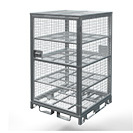 750 Series Cage Configurations
750 Series Cage Configurations Heavy Duty Cabinets & Benches
Heavy Duty Cabinets & Benches Heavy Duty Shelving
Heavy Duty Shelving Mega Bins & Pallets
Mega Bins & Pallets Packing Benches
Packing Benches Pallet Racking Accessories
Pallet Racking Accessories Parts Trays & Stor-Pak Bins
Parts Trays & Stor-Pak Bins Pegboard & Louvre Panels
Pegboard & Louvre Panels Plastic Bins
Plastic Bins Plastic Handling Solutions Bins
Plastic Handling Solutions Bins Plastic Pallets
Plastic Pallets Stack & Nest Bins
Stack & Nest Bins Storage Cages
Storage Cages Workplace Equipment
Workplace Equipment Workbenches
Workbenches Modular Workbenches
Modular Workbenches Electric Height-Adjustable Workbenches
Electric Height-Adjustable Workbenches Floor Matting
Floor Matting Industrial Weighing Scales
Industrial Weighing Scales Pallet Wrapping & Packaging Machinery
Pallet Wrapping & Packaging Machinery Ramps
Ramps Stationery Cupboards
Stationery Cupboards Storage and Stillage Cages
Storage and Stillage Cages Tool Trolleys
Tool Trolleys Tooling Cabinets
Tooling Cabinets Wheelie Bins
Wheelie Bins Workshop Equipment
Workshop Equipment Safety Equipment
Safety Equipment Gloves and PPE
Gloves and PPE Pallet Rack Post Protectors
Pallet Rack Post Protectors Safety Barriers & Bollards
Safety Barriers & Bollards Safety Knives & Cutters
Safety Knives & Cutters Signs and Traffic Supplies
Signs and Traffic Supplies Tool & First Aid Boxes
Tool & First Aid Boxes Construction Equipment
Construction Equipment Concrete Equipment
Concrete Equipment General Site Equipment
General Site Equipment Lifting Equipment
Lifting Equipment Site Storage
Site Storage Waste
Waste 










